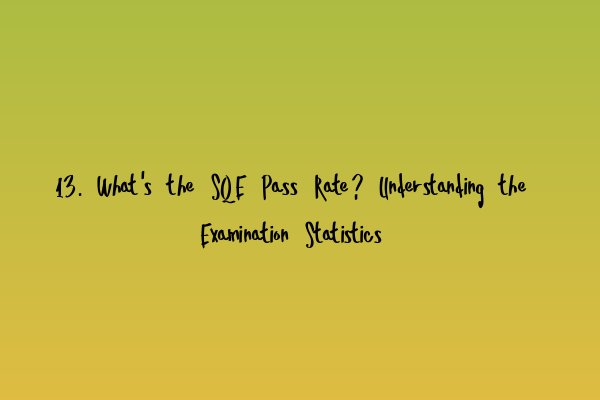13. What’s the SQE Pass Rate? Understanding the Examination Statistics
Gaining a comprehensive understanding of the SQE pass rate and examination statistics is crucial for anyone preparing to take the Solicitors Qualifying Examination (SQE). The SQE is a new assessment system that recently replaced the old route to qualify as a solicitor in England and Wales.
As an aspiring solicitor, you may be wondering about the pass rate and how this can affect your chances of success. This blog post aims to shed light on the SQE pass rate and offer insights into the examination statistics.
The SQE Pass Rate: Explained
The SQE pass rate refers to the percentage of candidates who successfully pass the examination. This pass rate can vary depending on various factors, including the difficulty level of the exams and the expertise of the candidates.
It’s important to note that since the SQE is a new assessment system, there is limited historical data available on the pass rates. However, based on the initial assessments conducted, the pass rate has been encouraging, with a substantial number of candidates successfully qualifying as solicitors.
Factors Influencing the SQE Pass Rate
Several factors can influence the SQE pass rate:
- Preparation: The level of preparation and study undertaken by candidates significantly affects their chances of passing the SQE.
- Quality of Education: The quality of education and training received can impact a candidate’s ability to perform well in the examinations.
- Experience: Candidates with relevant legal work experience may have a higher likelihood of passing the SQE.
- Adaptability: The ability to adapt to the new assessment system and its requirements can play a crucial role in the pass rate.
- Support: Access to proper guidance, mentorship, and study materials can significantly improve a candidate’s chances of success.
Understanding Examination Statistics
Exam statistics provide valuable insights into the performance of candidates, identifying areas of improvement and assessing the overall effectiveness of the examination system. These statistics include various data points such as:
- Pass Rates: The overall pass rate as well as pass rates for individual assessments.
- Average Scores: The average scores achieved by candidates, indicating the level of performance.
- Distribution of Scores: The distribution of scores across candidates, giving an idea of the spread of performance.
- Comparison to Previous Years: Comparisons to previous years’ statistics, if available, can provide insights into trends and improvements.
By analyzing examination statistics, you can gain a deeper understanding of the overall performance trends, identify areas of strength and weakness, and adjust your study strategies accordingly.
Implications of the SQE Pass Rate
While the SQE pass rate is an essential indicator, it’s crucial to understand that it should not be the sole determining factor when preparing for the examinations.
Focus on thorough preparation, comprehensive understanding of the exam syllabus, and consistent effort to develop necessary skills. With proper dedication and effective study techniques, you can increase your chances of passing the SQE, irrespective of the pass rate.
Conclusion
Understanding the SQE pass rate and examination statistics can provide valuable insights to aspiring solicitors preparing for the SQE. While the pass rate is indicative of the overall success rate, it should not be the sole determining factor in your preparation. Focus on thorough preparation, utilize available resources, and tailor your study strategies for optimal success.
For further guidance and support in your SQE journey, consult a qualified solicitor or a reputable SQE preparation course provider. Good luck with your SQE exams and future legal career!

Leave a Reply